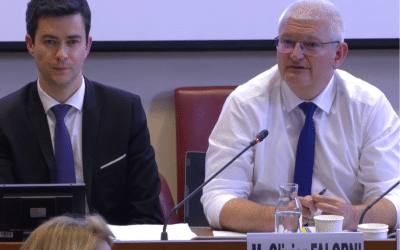Alliance VITA is supporting 2 draft bills* to be examined Thursday, June 16th at the National Assembly to reinforce the current law banning surrogacy in France, which had been undermined over the past 3 years.
For the past few months, Alliance VITA has continued to express its concern for the undermining of the ban on surrogacy. Initially, the so-called “Taubira directive” published in January 2013 made it easier to issue French nationality certificates to children born abroad to a surrogate mother. Then in June 2014 the ECHR condemned France for refusing to register civil status for births in the United States to surrogate mothers, and specified that the parental relationship with the biological father should be recognized. In July, the French Court of Cassation upheld the ECHR decision, henceforth authorizing the paternal relationship to be registered on the French civil status, associated with the name of the mother who gave birth, meaning the surrogate mother, when it was already registered on the foreign birth registry. Finally on March 7, 2016, the Appeals Court in Rennes ruled that only the paternal relationship should be registered on the French civil registry, whereas the existence of the mother who gave birth would be totally ignored.
This complete reversal in French case law has considerably undermined the dissuasive effect for the ban on surrogacy in France, since henceforth this evasion of the law, even when established, is no longer taken into account, nor does it imply any negative consequences.
In light of this background, Alliance VITA participated in the hearings organized by the Law Commission, and demanded that the law prohibiting surrogacy be reinforced.
Tugdual Derville, General Delegate for Alliance VITA states: « These two draft bills are primarily a means of testing the current opposition. Will opponents still be courageous enough to remain unanimously strong in their position against the abuse which is inherent in all forms of surrogacy? This could be a harbinger of an ethical reawakening, in the context of a possible change in the political majority. Indeed, until now, whenever the right wing was in power, they tended to endorse all the libertarian drifts imposed by the left wing. Fortunately, even on the left, there is now a number of voices denouncing the regression that surrogacy represents. This subject goes beyond partisan differences…”
Caroline Roux, Director of VITA International confirms: “For all those concerned about procreation ethics, it is extremely troubling to see this “procreation market” being imported into France. To have recourse to surrogacy is a serious violation of the rights of women and children. France would be forsaking its ethical foundations by allowing an ultra-liberal procreation business. This is why the two draft bills go far beyond the traditional left-right political dichotomy: there has to be agreement by all who support human dignity, women’s rights and the protection of children. We need to have a clear legislation, as in the bill being proposed, and it needs to be fully enforced. It is essential that the rule of law be implemented effectively.”
Alliance VITA is also actively involved in the No Maternity Traffic petition, which obtained more than 100,000 European signatures demanding an international ban on surrogacy. This petition has just been recognized as admissible by the Council of Europe, which transmitted it to the Committee on Social Affairs to be included in the current study on Surrogacy and Human Rights. Scheduled to be examined during the session next June 21 – 22 this study is a major risk. It is essential that France and its Parliamentary Representatives fight for an explicit and universal condemnation of Surrogacy.
*Reminder concerning the two draft bills:
- The first bill is aimed at obtaining constitutional recognition for the principle of the inalienability of the human body.
The second draft bill is aimed at fighting against surrogacy. It would reinforce criminal sanctions, mainly against the intermediaries promoting surrogacy. The bill would specify that foreign civil status cannot be recognized in France for cases resulting from a surrogacy practiced abroad. It also recommends that France propose adopting an international convention banning reproductive and gestational surrogacy.



